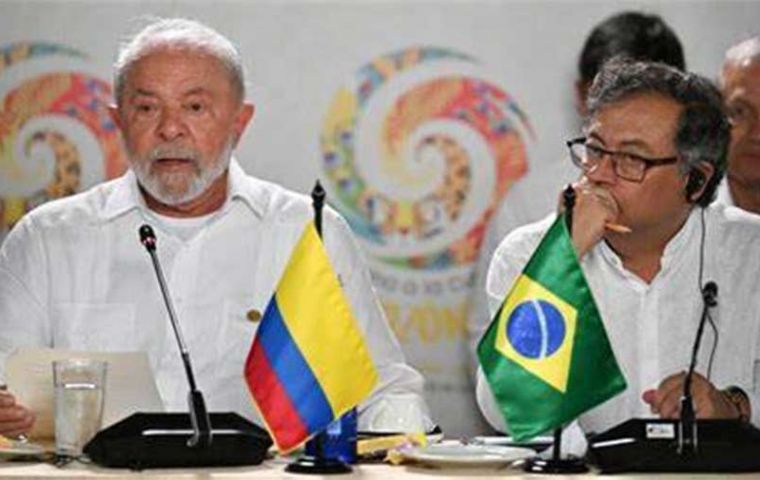MercoPress. South Atlantic News Agency
Petro and Lula discuss Amazon crisis
 One of the greatest challenges facing the Amazon countries is the strengthening of the Amazon Cooperation Treaty Organization, Lula and Petro agreed
One of the greatest challenges facing the Amazon countries is the strengthening of the Amazon Cooperation Treaty Organization, Lula and Petro agreed Presidents Gustavo Petro of Colombia and Luiz Inácio Lula da Silva of Brazil convened Saturday at the so-called Leticia Summit in the capital of southern Colombia's Amazonas department to discuss the deterioration of the Amazon rainforest and share experiences on the issue.
Petro and Lula held a first meeting at the National University of Leticia, where they participated in the closing plenary of the Technical Scientific Meeting of the Amazon, a gathering of environment ministers of countries with territory in the Amazon.
The Leticia Summit was a prelude to the Amazon Summit the Brazilian government is holding in Belem next month, to be attended by leaders of the countries that are party to the Amazon Cooperation Treaty Organization: Bolivia, Brazil, Colombia, Ecuador, Guyana, Peru, Suriname, and Venezuela.
“These meetings, these common struggles, even these discussions have to do with the defense of life, a simple concept, but without which everything else is superfluous,” said Petro, who once again presented his administration's plan to overcome his country's dependence fossil and non-renewable energies to “avoid the sixth extinction of life on the planet.”
“We believed that progress was the destruction of trees. ... Today that is nothing other than the destruction of life,” Petro also pointed out.
Lula recalled that “deforestation in the Amazon affects rainfall in the Southern Cone, threatening the water supply for human consumption and economic activities.” He also pointed out that the Amazon has “50 million inhabitants from 400 indigenous groups speaking 300 different languages,” in addition to having the largest freshwater reserves on the planet, including “a true underground ocean.”
“We will have to demand together that rich countries fulfill their commitments,” he added.
Both presidents agreed that one of the greatest challenges facing the Amazon countries is the strengthening of the Amazon Cooperation Treaty Organization, as well as the construction of a joint sustainable development policy for this region. They also insisted on the urgency of establishing a common discourse for the 28th session of the Conference of the Parties to the United Nations Framework Convention on Climate Change (COP28) to be held later this year in the United Arab Emirates, where Colombia will propose to swap foreign debt for climate actions.
The Leticia Summit was attended by indigenous peoples, non-governmental organizations, scholars, and leaders from companies willing to reverse the damage caused by deforestation and illegal mining in the Amazon rainforest.
In Leticia, a town in the Amazon's triple border region between Colombia, Brazil, and Peru, organized crime has recently increased its hold. British journalist Dom Phillips and Indigenous activist Bruno Pereira were killed in the neighboring Javari Valley region last year.
In 2019, Colombia, Bolivia, Ecuador, Brazil, Peru, Guyana, and Suriname signed the Leticia Pact to strengthen coordinated actions for the preservation of the natural resources of the Amazon.
Since taking office in January, Lula has strived to put environmental protection and respect for Indigenous peoples' rights at the heart of his third term. He successfully pursued the resumption of international donations for the Amazon Fund that combats deforestation, launched a military campaign to eject illegal miners from Yanomami territory, committed to ending all illegal deforestation by 2030, and restarted the demarcation of Indigenous areas.
Petro has also proposed the creation of a multilateral 20-year financing fund to support farming communities contributing to deforestation, to compensate them for conservation and regenerative activities instead.




Top Comments
Disclaimer & comment rulesCommenting for this story is now closed.
If you have a Facebook account, become a fan and comment on our Facebook Page!